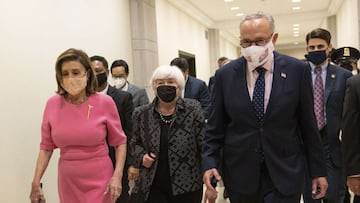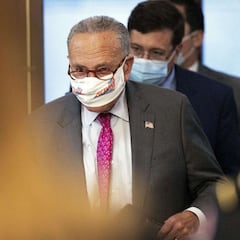Why is the White House planning for a government shutdown?
All federal agencies are being asked by the White House to update their contingency plans for a shutdown, should Congress not pass a spending bill.


Congress has less than five days to pass a spending bill or a government shutdown will be triggered
The United States federal government is an enormous bureaucracy that makes “shutting down,” a logistical nightmare. To prepare for a possible shutdown, the White House Office of Management and Budget periodically instructs agencies to write up contingency plans in case of a shutdown. Many of these agencies have updated their plans recently, because of the shutdown that occurred in 2018-2019.
While some agencies have legal mandates that ensure they remain functional, others will see nearly their entire staff furloughed.
For example, the Department of Labor will retain around 21 percent of its staff during a government shutdown, whereas the Social Security Administration will retain a much higher percent -- 85 percent -- because the responsibilities of these workers are “implied by law.”
For some agencies, like the Department of Labor and the Social Security Administration, preparing for a shutdown takes less than a day, while others like the Department of Veterans Affairs need three days to implement their contingency plan.
Psaki says the federal government is "certainly" concerned about the possibility of a government shutdown next week if Congress does not pass funding: "Our goal and our focus is on preventing that from happening" https://t.co/Nl3aE1ocwm pic.twitter.com/ld8gStpuBW
— CBS News (@CBSNews) September 22, 2021
What does it mean to be furloughed during a government shutdown?
During a government shutdown or financial crisis, governments may choose to keep employees on staff, but cut or eliminate their pay for a period of time. When this happens, it is known as a furlough.
When the federal government shutdown, thousands of workers are furloughed, meaning they are sent home without pay until Congress passes a bill to reopen.
Typically once the shutdown has ended, federal employees will be paid for the time they were furloughed. It is the responsibility of Congress to agree on the budget and there is a longstanding belief that federal workers should not be penalized for the failure of lawmakers, who continue to see their paychecks. However, federal contractors are often left out, and never see the income lost during a shutdown.
Over the past few decades, nearly every agency has outsourced important jobs to third-party companies. This includes companies that employ custodians, cooks, mechanics, landscapers, security officers, and many other professionals to provide essential services within the federal government. By contracting out this work, the government can avoid paying for expensive benefits provided to federal workers. And when a government shutdown occurs, they are forgotten and Congress takes no responsibility for their well-being.
Who gets paid after a government shutdown?
After the last shutdown, the Washington Post interviewed a federal contractor named Michelle Serrano who worked as a Smithsonian’s National Museum of the American Indian as a security officer to understand here what the loss in wages meant for her family.
While agencies can opt to pay federal contractors because the budgets for their labor are factored into calculations, many choose not to.
"You feel hopeless. And you feel helpless." These federal workers and contractors explain how the government shutdown has affected them as they're either furloughed or working without pay. https://t.co/52OZFeA64m pic.twitter.com/SGQIYpOW5d
— CNN (@CNN) January 9, 2019
"You feel hopeless. And you feel helpless." These federal workers and contractors explain how the government shutdown has affected them as they're either furloughed or working without pay. https://t.co/52OZFeA64m pic.twitter.com/SGQIYpOW5d
— CNN (@CNN) January 9, 2019
Serrano was not paid because the Smithsonian Institution did not company under which she is employed. The shutdown cost her around $3,000 and her family had to quickly adjust to the sudden drop in income by getting other jobs to cover basic costs as well as tuition for her daughter’s college tuition.
Related stories
Linda St. Thomas, the chief spokesperson for the Smithsonian Institution, defended the decision saying, “In the event of a government shutdown and our buildings are closed, we will not pay the security firm.” However, federal workers, formally employed by the Smithsonian Institution who was not working during the shutdown, because as Ms. St. Thomas said, "the buildings were closed," received their pay. What makes them more worthy? Thier title? Thier educational background? Their value-added to the bureaucracy? Did these workers have to get another job to cover their loss of income?
While the decision may make financial sense for the organization, it leaves low-wage federal contractors, who provide essential services each day to fend for themselves. The government devalues the labor carried out by these workers. Congress's unwillingness to protect these vulnerable people from their own failures is not only unethical and immoral, but it is an example of the systematic inequities that plague American society.

